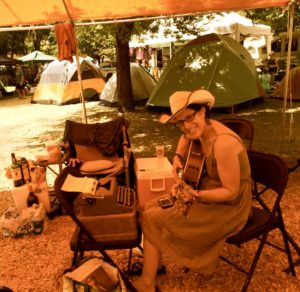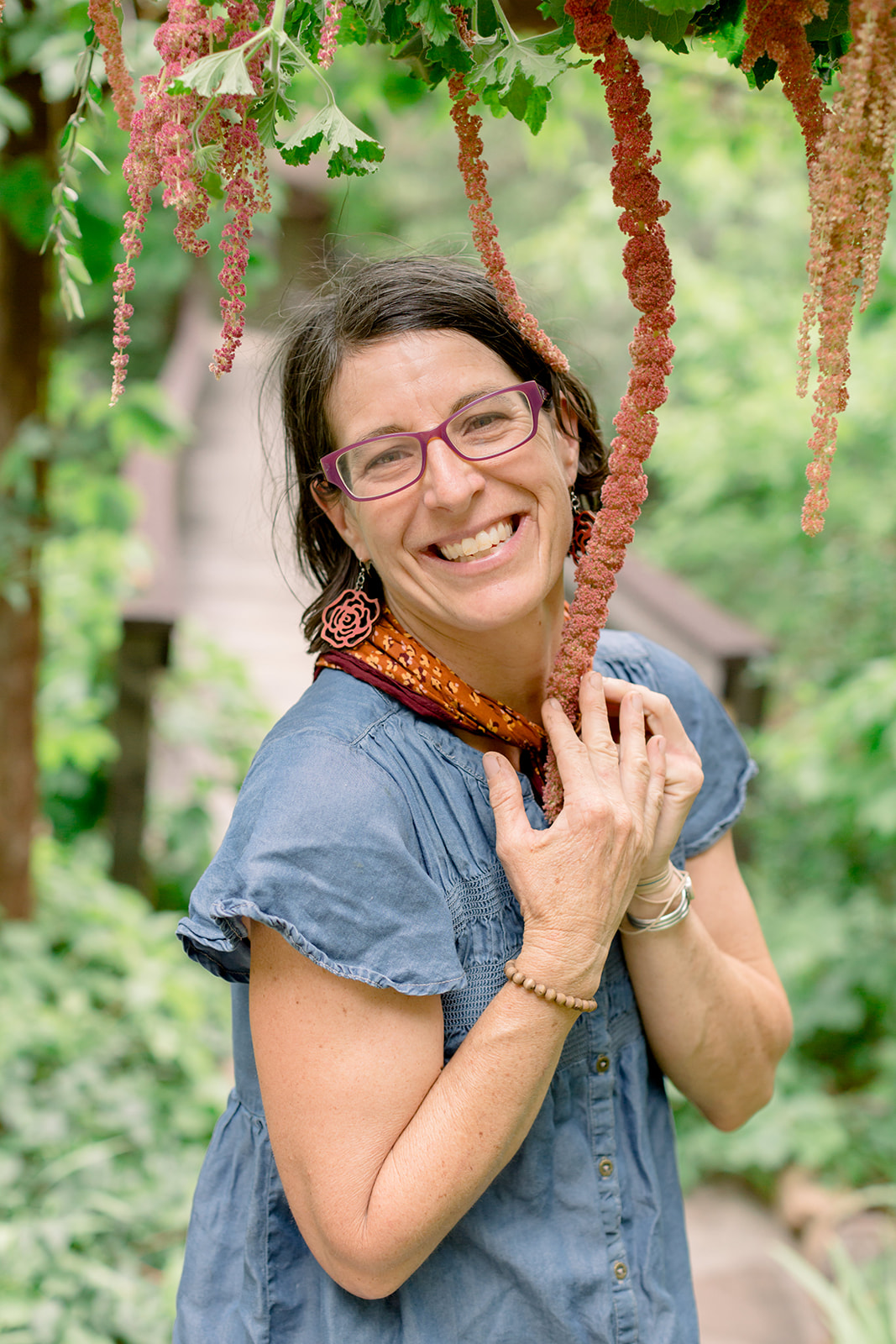 It’s first thing on a Monday morning and I’m sitting in my folding chair pew at the Church of Mary. There are about 25 of us circled around singer songwriter Mary Gauthier under a tent canopy on the grassy lawn at Planet Bluegrass. The festival stage is nearby, and just beyond, the St. Vrain River flows fresh from the Rocky Mountains. Part preacher, part midwife, Mary speaks the gospel of songwriting with authority and tenderness. In her sermon this morning, she tells us that songs come from God to teach us something. She asks if anyone wants to share a verse and chorus to a song they are stuck on. Many eager hands go up, and mine is in the last and most tentative of the wave. It is my fourth year coming to the Song School, and I still tremble like a leaf in the wind at the thought of performing one of my songs in front of a group of intent songwriters. Cradling the head of your newborn song in her hands, Mary coaxes it into the world for its first breath. She asks a simple, yet daunting question, “What do you want to say?” In only 30 minutes we can feel the difference her line of questioning makes in the way the song feels on our skin. With a few word changes, tears are streaming down more than a few faces.
It’s first thing on a Monday morning and I’m sitting in my folding chair pew at the Church of Mary. There are about 25 of us circled around singer songwriter Mary Gauthier under a tent canopy on the grassy lawn at Planet Bluegrass. The festival stage is nearby, and just beyond, the St. Vrain River flows fresh from the Rocky Mountains. Part preacher, part midwife, Mary speaks the gospel of songwriting with authority and tenderness. In her sermon this morning, she tells us that songs come from God to teach us something. She asks if anyone wants to share a verse and chorus to a song they are stuck on. Many eager hands go up, and mine is in the last and most tentative of the wave. It is my fourth year coming to the Song School, and I still tremble like a leaf in the wind at the thought of performing one of my songs in front of a group of intent songwriters. Cradling the head of your newborn song in her hands, Mary coaxes it into the world for its first breath. She asks a simple, yet daunting question, “What do you want to say?” In only 30 minutes we can feel the difference her line of questioning makes in the way the song feels on our skin. With a few word changes, tears are streaming down more than a few faces.
Woody Guthrie once said the folk singer’s job is to disturb the comfortable and comfort the disturbed. At Song School, 150 aspiring songwriters of all ages, backgrounds, experience and musical styles come together for five days to acquire the tools necessary to write songs that will heal the world. There are workshops on all aspects of musicianship—writing lyrics, crafting melody, music theory, performance, voice, guitar and making it in the music business. We sit in circles and listen to one another’s songs and learn how to make them better. It is a cross between band camp and a music therapy session held at a rainbow gathering, but songs are the drugs we use to reach an altered state of consciousness.
I started coming to Song School four years ago determined to start taking my music more seriously. I went alone and arrived late to find all the campsites were taken. A few kind souls invited me to camp with them. “Are you a first-timer? We are, too!” An instant bond was formed, and immediately I had a small family to share in this experience. At the end of the week, when I played my song at open mic, I had three backup singers, a lead guitar and percussionist on stage with me. This core group faithfully returns to the camp and every year inducts another new person into the fold to support and encourage.
I find myself on a roller coaster of emotions at Song School as I try to get to the essence of what I am trying to say and work around roadblocks I have created for myself. I experience shimmering moments of belonging and connection with a tribe of people who share a desire to sing about everything that defines our human experience— beauty, joy, pain, darkness and emptiness. Every year I peel back another layer of my own skin to reveal more truth. I learn that this is how you allow other people in so you can dance together. I recognize the disguises I wear to protect myself even when I sing. And what are songs for but to connect hearts? To write good ones I first need to understand my own heart, which is not always an easy or comfortable process. At Planet Bluegrass I sit by the river alone, and sometimes with other song seekers, and sing. Music helps me unlock a room in my heart that moves me to write. Song School makes me braver and more fearless about what I want to say. It inspires me to write songs that penetrate cocktail-party small talk and get to the heart of the matter.
In a workshop titled “How Music and Activism Can Change the World,” Egyptian musician Ramy Essam shares his story of how he inadvertently became the voice of the Egyptian revolution in 2011 when he began to sing what protesters were chanting in the streets. One day, he was performing these songs for 300 people, and practically overnight the crowd in Tahirir Square grew to millions of people calling for the resignation of President Hosni Mubarak. His music provided a soundtrack for the struggle and change. Essam was tortured as a result and eventually had to leave his country. From Sweden, he continues to be inspired to write and perform songs to fight for a justice. “Music is the most peaceful weapon in the world,” he says.
At Song School we learn that the key to writing great songs is paying attention and writing with urgency and purpose, as if life depended on it, because a song could save someone’s life. We become alchemists turning something ordinary into something precious. New songs exist everywhere. We only must look and have the courage to bring them forth to share with the world.

